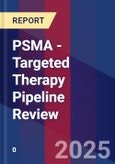This product provides basic information on approved therapeutics and therapy candidates in research and development targeting PSMA.
This product consists of:
- Competitors described in a tabular format covering drug code/INN, target(s)/MoA, class of compound, product category, indication(s) & R&D stage.
- Project History with links to source of information (press release, homepage, abstracts, presentations, annual reports etc).
- One-month online access to a database for therapeutics and therapy candidates targeting PSMA (prerequisite: access to internet).
This product is delivered on the very same day of purchase by e-mail containing competitor and project history reports in pdf format and database credentials. Reports are prepared on the same day.
An estimated 268,000 new cases of prostate cancer in the United States are expected in 2022. Although the overall 5-year survival rate is over 95%, only about one in three patients live past 5 years if metastases are present, and prostate cancer remains the second leading cause of cancer deaths in men after lung cancer. Prostate cancer typically transitions from hormone sensitive to castration resistant, and patients with metastatic castration-resistant prostate cancer (mCRPC) survive for only about 2-3 years. In addition to androgen deprivation therapy (ADT), there have been a number of therapies approved in the mCRPC setting over the past two decades, including taxane chemotherapy (docetaxel and cabazitaxel), immunotherapy (sipuleucel-T and pembrolizumab), androgen receptor pathway inhibitors (ARPIs; abiraterone and enzalutamide), and targeted therapies such as poly (ADP-ribose) polymerase (PARP) inhibitors (olaparib and rucaparib). Despite the increasing size of this armamentarium, the vast majority of patients with CRPC progress and novel agents are urgently needed to improve survival while maintaining quality of life.
Prostate specific membrane antigen (PSMA) expression is prevalent in prostate cancer, preserved during malignant transformation, and increases in response to anti-androgen therapies, making it a commonly targeted tumor associated antigen for prostate cancer. PSMA mainly serves as a binding target for delivery of a variety of payloads, including, but not limited to, cytotoxic drugs in antibody-drug conjugtes, recruitment of cytotoxic T-cells in bispecific antibodies or directly PSMA-targeted chimeric antigen receptor T-cells. PSMA is also an important binding target for delivery of radioactive payloads in targeted radioligand therapy, whereby binding molecules can be small molecules, peptides and antibodies. A variety of radioligands are being evaluated or already been approved, including lutetium 177, actinium 225, thorium 227, cupper 67, or iodine 131.








